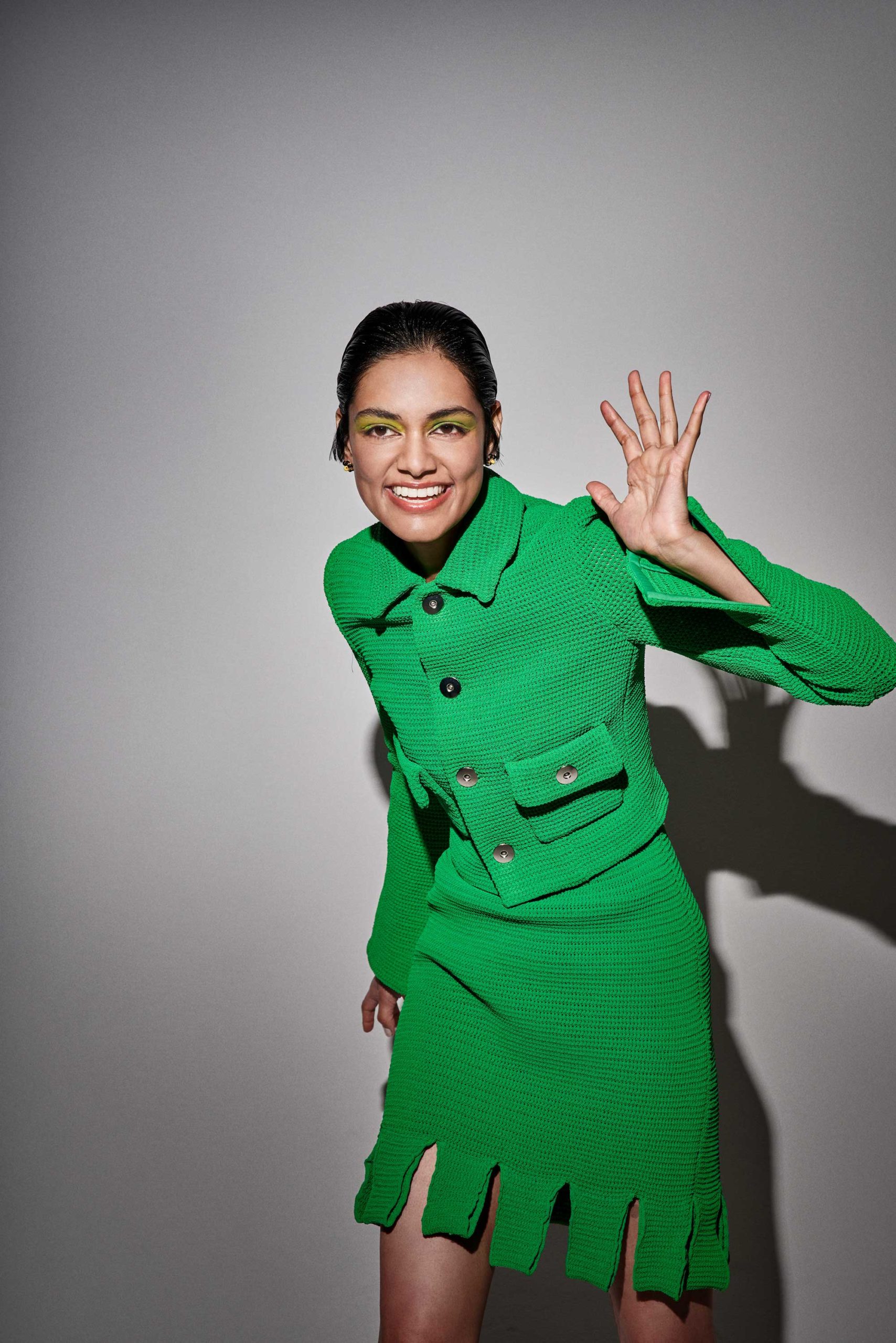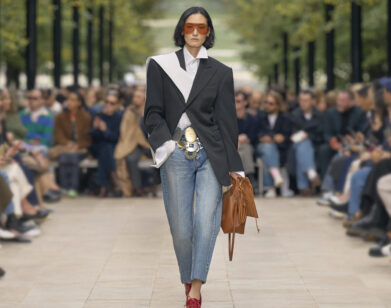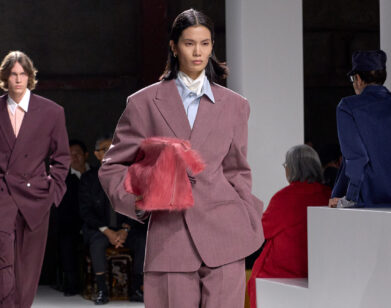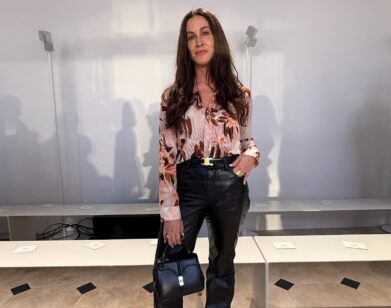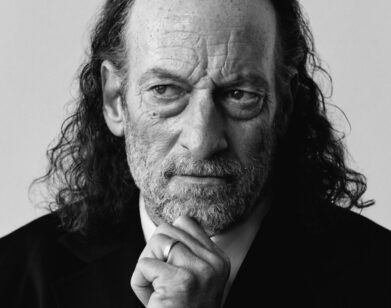in conversation
Daniel Lee Is the Face of a Company and Bret Easton Ellis Has Questions
Daniel Lee. Photo courtesy of Bottega Veneta.
Daniel Lee may be the face of a global fashion line, but his clothes speak for themselves. Since taking over Bottega Veneta in 2018, the unassuming British designer has vaulted the 55-year-old Italian house into the future, with a combination of uncompromising vision and untamed ambition. And while his profile has dramatically increased—Lee was known mostly in fashion circles when he was hired as Bottega’s creative director following a six-year stint at Celine—the 35-year-old Central Saint Martins graduate has shunned social media and bristles at press obligations. Silence wasn’t an option, however, when, at the 2019 Fashion Awards, Lee accepted a record four awards in recognition of his work. By the time he went onstage to collect his Designer of the Year trophy, the most he could muster was, “Thank you.” But when the author Bret Easton Ellis called him up to discuss his rapid rise, Lee found himself more than ready to talk.
———
BRET EASTON ELLIS: To start off, what have you done today?
DANIEL LEE: I’ve been working. With this job, there’s always plenty to keep you occupied. If I was stuck inside without the work, I think I’d go crazy.
ELLIS: Did you have breakfast?
LEE: No. I had coffee.
ELLIS: Lunch?
LEE: I had lunch, but I don’t eat very much when I’m working. The adrenaline keeps me going.
ELLIS: Do you have any trepidation doing interviews in what seems like this new zero-tolerance corporate culture? Are you afraid that you might say the wrong thing, or that something might get reinterpreted as the wrong thing, even if you didn’t mean it? I think about this a lot because I do a podcast, and I have people on, and we always have to circle this new notion. Is it difficult to be real in the culture we live in now? You live a very private life. You don’t have a social media presence, but you have become the face of a company in a very short period of time. Is there something performative about this, and how do you navigate everything so that you’re okay with just being yourself? I’m often haunted by what would happen to a young Alexander McQueen if he was starting today.
LEE: That’s a long question, Bret. I’m trying to remember the beginning.
ELLIS: It was almost a rant.
LEE: It’s no secret I don’t particularly like interviews. I’m not scared of them, but I think there’s a bit of a common misconception. I took over this brand less than three years ago, so it’s pretty relentless. Not only am I trying to define a new creative voice, but I spend part of my time trying to motivate a team. And then my days are split between working on different projects, from designing a collection to communicating about the collection, to thinking about the environment that the collection’s perceived in, whether it’s being bought or it’s in a show—everything from the store concept to the website to the show space. And then, of course, we live in a time where you have to be very careful about what you say. That’s no secret. I think it’s very easy to offend people in this moment. I think certainly interviews are quite a guarded moment, and I see people around me from my industry turn into these slick media robots, and that’s not really something that interests me. I’d rather have more personal and human conversations.
ELLIS: We’re certainly in a different place than where Alexander McQueen could exist, or even when Tom Ford was having his midlife crisis and hitting on young male journalists and it seemed to be okay.
LEE: [Laughs] He was hot, so I’m sure they were okay about it.
ELLIS: Actually, a lot of those journalists, I remember reading, were straight. I think that added a certain tension to the pieces, when Tom would blatantly come on to them and say, “I’m in room 608.” But I think those days might be over.
LEE: I really am fighting every day to try to make my team and the environment that we’re in as uncorporate as it can possibly be for a company of this size. Our team’s like a family, and we definitely have fun, because we’re not curing cancer, or COVID for that matter. We’re just trying to make some nice things for people to enjoy, so we try to take it lightly. Obviously, I think the world has changed massively since the ’90s when those guys were in fashion. Now, there’s so much more to the job than designing two collections a year. Every single day you have to put out communications. You’re also a global face of a brand. I think we live in this moment of celebrity obsession, where everyone wants to know a story and an explanation and a “why,” but sometimes we should just sit back and look and stop asking so many questions.
ELLIS: Did you have goals set for yourself when you took over Bottega Veneta, and where are you in terms of reaching those goals?
LEE: I think it was just, “Don’t embarrass yourself and don’t embarrass the company.” I wanted to succeed and I wanted to sell. I guess that goes through everyone’s head when they first take on a job like this, because it was a complete gamble on my part and theirs. I thought, “Fuck, if this doesn’t work, I’m 32, and I’m not from a rich family, so I don’t have the money to survive the rest of my life.” During the first year, I was so scared to spend any money. I thought, “You have to save every penny you make because if this goes wrong, you need to go back to school and start again.” I’m pretty ambitious and very hardworking, so I wanted to be relevant and part of the conversation.
ELLIS: What lessons do you think you learned under Phoebe [Philo] at Celine, and how have they helped you in your current role?
LEE: I’ve learned from every great creative director I’ve worked with, and I was fortunate that there was Phoebe, Nicolas [Ghesquière] at Balenciaga, and I saw a tiny bit of [Martin] Margiela, and the thing that they all had in common that I also try to maintain is never to compromise, to always stick to your vision. Try not to look sideways. Try to stay true to who you are.
ELLIS: That quality is obviously what Bottega wants from you, too, don’t you think?
LEE: Yes. But I do think that being a part of such a corporate machine, I’m fortunate they’re very understanding of what true creativity is, because I think the word “creative” is so misused today. They do allow for that to blossom, whereas I certainly think in my industry, there’s also huge influence from trends or what they think they should do for social media, because that works in a certain market. Sometimes that clouds the creative vision. But my tenure here so far has been completely free of that.
ELLIS: Are there any films or songs or other cultural inspirations that represent what you aspire to do with your designs?
LEE: That’s always a hard one to answer because it’s almost like the most straightforward thing. I’m much more influenced and much more creatively driven by the product and by the object. It doesn’t start with a person. I think it comes to the person after it’s created. For me, it’s really about design that can be then taken into a person’s life. If I think about an icon that’s always around, it’s PJ Harvey. She’s always been an endless source of inspiration for us. And then, I think back to the beginning of Bottega, when we spent a lot of time going through all the great Fellini and Visconti films, trying to really understand this idea of Italian spirit, because I was conscious that I was designing for an Italian house, and I really wanted that to become part of the language.
ELLIS: Who do you think is beautiful right now? I’m asking about women as well as men that you find attractive. Is there anyone out there you have a crush on?
LEE: Oh my god. I should say my boyfriend.
ELLIS: Jake Gyllenhaal?
LEE: Jake Gyllenhaal’s pretty hot. I wouldn’t say no. But the person who I love when she wears the clothes is Rihanna, because I love what she represents. I am typically drawn to someone who really doesn’t give a shit about what everyone else thinks and really seems to be in charge of their own destiny. I’m trying to think of a guy now that I have a crush on, but my taste is quite bad.
ELLIS: [Laughs] What do you mean it’s quite bad?
LEE: It’s not very intellectual. I don’t know. I’m quite into the jocks.
ELLIS: Oh my god, so am I. I’m not sitting around fantasizing about James Joyce. Sometimes the dumber the better. How do you balance the creative aspects of the job with the financial realities of leading this large fashion brand that is owned by a large corporation? Is there any tension there?
LEE: I think the best thing you can do is to try and just get on with it. Fortunately, I’m very busy, so I don’t have much time to think and worry. But when you think about the enormity of it all—and there’s not only the money side but also the number of people’s lives that are dependent upon the decisions that are made, and on the work being successful—it can be a pretty heavy burden. For me, the best thing is to keep playing with the idea of trying to make it as good as it can be, and then to just hope for the best. I’m very aware of the weight of it, but I just try to keep focused on the things that I think matter. Thankfully, it’s worked so far.
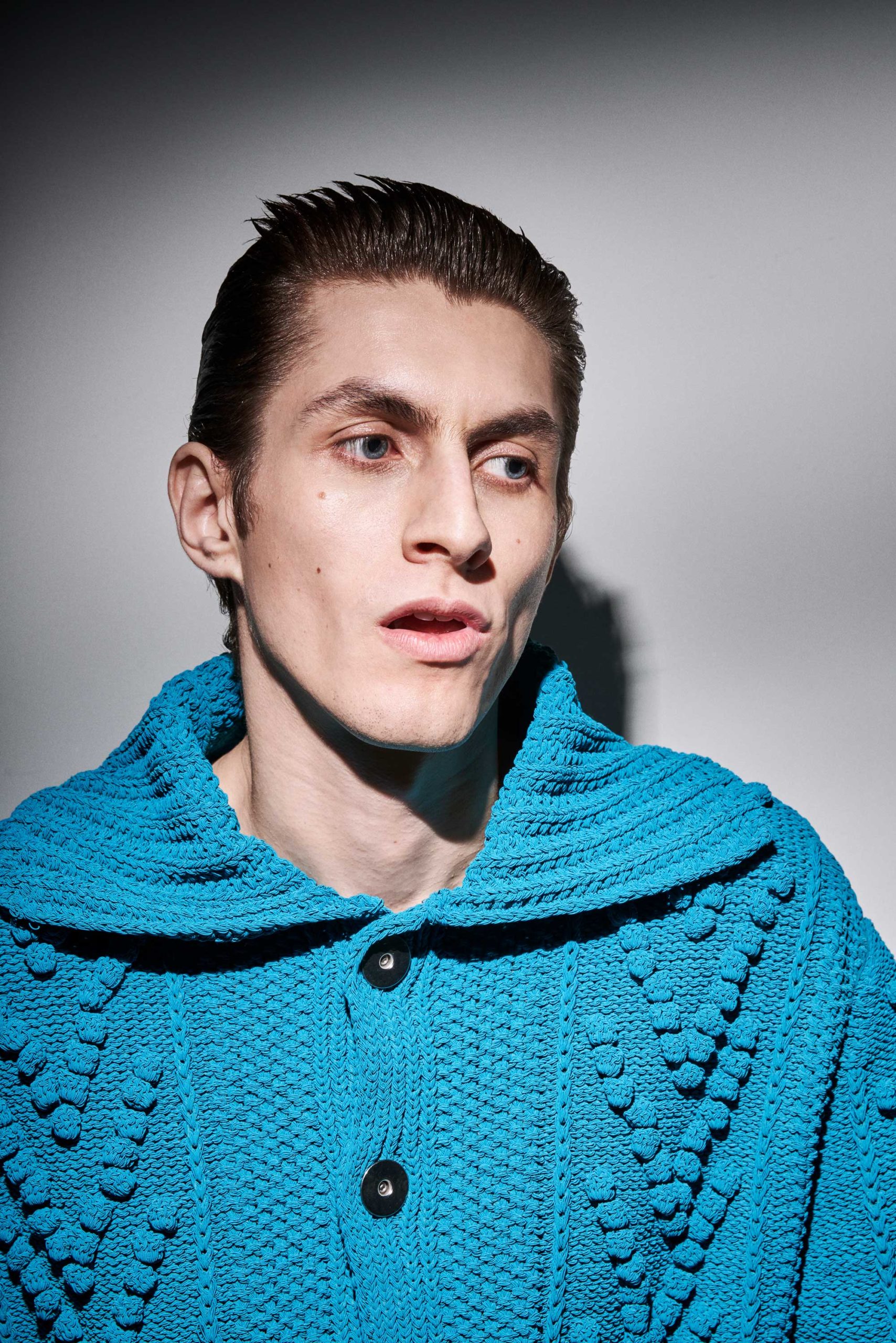
ELLIS: The Pouch has become a phenomenon for the brand. Were you surprised by its popularity, and what do you attribute it to? Is this just how fashion works, or were there certain things that were aligning to make this bag so big?
LEE: That was a complete fluke. The bag was designed very, very quickly because I arrived at Bottega right before a collection was due to be finished. We wanted to shoot some advertising, and in order to do that, I needed some things to shoot, so I pulled together a very simple rack of clothes—a basic T-shirt, a tank top, a pair of shorts, a suit—and then quickly designed a couple bags to have something to shoot with. The pouch was loosely based on a bag that Lauren Hutton carried in the film American Gigolo. And it was a huge surprise that the bag had such success because it was just something that was done to get through to the next season. We were putting much more effort into the things that were being designed for the next collection.
ELLIS: No designer had ever won four awards at the Fashion Awards. Not Alexander McQueen, not John Galliano, no one. And yet, in 2019, you won four of the top awards, including Brand of the Year and Designer of the Year. How did you feel the day after that awards show as opposed to the day before?
LEE: The day after the awards, early in the morning, I was on a flight to Miami for Art Basel because we were doing an event there. I think I was hungover on the plane. But, yeah, I was astounded because for the first year, I was really in a bubble. I had absolutely no awareness of what was going on, that the world was so aware of our work, that people even really knew who I was, because I was busy in the studio. Things were much more hectic back then. I was doing a lot of the stuff alone. So when I won those awards, I couldn’t quite believe it. I had suspicions that maybe we’d win one, but I was mostly terrified to get up on the stage and do the speech in front of all those people. I haven’t done any public speaking since I was at school, so to be in front of all those people from the industry, and so many famous faces, was pretty incredible. I still can’t believe that happened.
ELLIS: I was thinking about becoming the “It” person at a young age. I had a similar rise when I was in my early 20s. I guess you breathe a big sigh of relief, because you’ve somehow done it in a way that’s very hard for a lot of people to do. It pushed me to try and top myself, I suppose. There was an added pressure to that, because being crowned the Next Big Thing can be a hindrance to anyone, whether you’re a writer or a filmmaker or a designer. You have said that you were under no illusions about the shelf-life of a designer. Are there any designers whose careers you hope to emulate in terms of longevity and vision?
LEE: I admire the people who know when to say enough’s enough, and they go out with grace rather than trying to carry on. Those people almost become cult figures, and I think there’s something really chic about that. Going back to the first thing you said, I think people like us, we’re never satisfied. There’s so much more to do. I’ve proven some things to myself, sure, but all I think about is what I haven’t done yet. People like me are constantly setting ourselves new goals because we want to learn and become better. Helmut Lang and Margiela each had an incredible period of design relevance, and did incredible work that’s still heavily referenced today, but both of them knew when it came time to completely disappear from the public eye and from the industry, because they knew that they’d done enough. Why let themselves dwindle?
ELLIS: But you are becoming, it seems, the public face of the company. You’re young. You’re photogenic. Would you prefer to remain behind the scenes, or are you okay with becoming the face of the menswear brand, something like Tom Ford or Ralph Lauren before you?
LEE: I’m okay with it. But what I will also say is that I always want the work to speak for itself, for the work itself to be more important. I’d rather people know my work than my face. I’m not scared of my picture being taken. In fact, I quite enjoy it. And my family certainly likes to have all the pictures at home. But I want people to remember the work. That’s why I try to hold back from overexposure. I don’t want people to become bored.
———
Models: Henry Kitcher at Viva London and Zinnia Kumar at Anti-Agency
Hair: Naoki Komiya using Bumble and Bumble at Julian Watson Agency
Makeup: Ciara O’Shea using Mac Cosmetics at LGA Management
Lighting Technician: Neil Bennett
Manicure: Liga Tukmane using EMI Nail Polish at Carol Hayes Management
Photography Assistant: Kiran Man
Fashion Assistant: Bianca Raggi
Retouching: Jonathan Broadbent
Casting: Establishment

